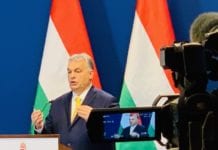By Stefan J. Bos, Chief International Correspondent BosNewsLife
BUDAPEST/SARAJEVO (BosNewsLife)– Preliminary election results in ethnically divided Bosnia-Herzegovina suggest that its three-person presidency will remain deadlocked over the country’s future, with two leaders of the ethnically divided nation advocating unity and a third pushing for its breakup. Sunday’s vote has been closely watched by the international community.
Over three million voters had the choice Sunday between a whopping 8,000 candidates for Bosnia’s central parliament, several regional assemblies, the Bosnian Serb president and vice president, and the federal presidency, which is shared among the main ethnicities.
Initial results show that the son of Bosnia’s wartime Muslim leader will be one of the country’s three presidents, who each represent either Muslims, Croats or Serbs.
The late President Alija Izetbegovic’s son, Bakir, says he is ready to work with all ethnic groups in the fractured nation.
“We are going, in my opinion, to stabilize the situation in Bosnia and Herzegovina and to bring [a] better future to citizens of Bosnia and Herzegovina which means peace [and] better conditions for [the] development of the economy,” he said.
The man ahead for the presidency’s Croat seat, Social Democrat Zeljko Komsic, is also seen by election observers as a supporter of a unified, multiethnic nation. Bosnia is currently divided between two entities, the Muslim-Croat Federation and the Serb’s Republika Srpska.
But the favorite for the presidency’s Serb representation, Nebojsa Radmanovic of the Alliance of Independent Social Democrats, wants Bosnian Serbs to split from the rest of the country.
His views are shared by the Serbian entity’s Prime Minister, Milorad Dodik, who is expected to become Republika Srpska’s president.
That worries Western leaders. They view the strengthening of central institutions as key for the former Yugoslav republic to end its economic crisis and become a member of the European Union and North Atlantic Treaty Organization, NATO.
The complicated political structure was inked in the Dayton peace agreement that ended the Bosnian ethnic war of the early 1990s, which left at least 100,000 people dead and two million displaced.
Bosnia’s International High Representative, Valentin Inzko, said in a statement that he hopes Sunday’s ballot will bring changes in the country because in his words “if there are no changes, the elections are not necessary.”








